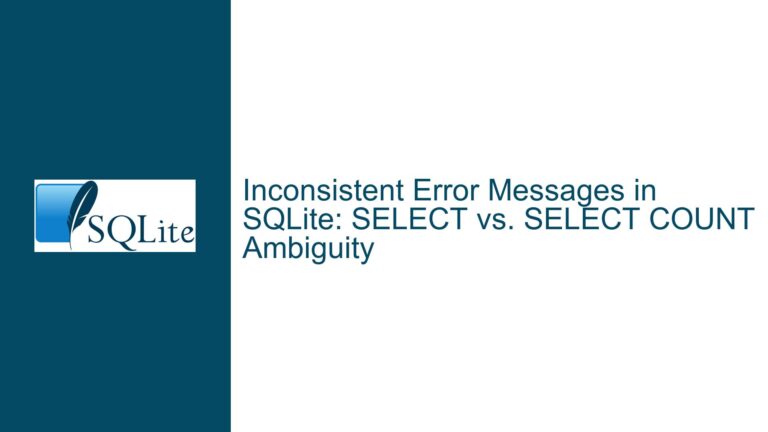Incorrect Query Results in SQLite RTREE Virtual Table Due to Integer Overflow
Issue Overview: Mismatch Between COUNT and SUM Results in RTREE Virtual Table
The core issue revolves around a discrepancy in query results when performing conditional aggregation on an RTREE virtual table in SQLite. Specifically, the query SELECT COUNT(*) FROM v0 WHERE c2 > 9223372036854775807 returns 0, while the query SELECT SUM(c2 > 9223372036854775807) AS 'total' FROM v0 returns 1. This inconsistency is unexpected and problematic, as both queries are logically intended to count the number of rows where the value in column c2 exceeds 9223372036854775807.
The RTREE virtual table is a specialized table type in SQLite designed for spatial indexing, often used for range queries. It stores multi-dimensional data and supports efficient querying of ranges. In this case, the table v0 is created with three columns (c1, c2, c3), and a single row is inserted with the values (127, 9223372036854775807, 9223372036854775800). The issue arises when querying this table with conditions involving the column c2, which contains a value at the upper limit of a 64-bit signed integer (9223372036854775807).
The discrepancy between the COUNT and SUM results suggests an underlying issue with how SQLite handles comparisons involving large integers in the context of RTREE virtual tables. This behavior is particularly concerning because it violates the principle of least surprise, where logically equivalent queries should produce consistent results.
Possible Causes: Integer Overflow and RTREE Comparison Logic
The root cause of the issue lies in the interplay between SQLite’s handling of large integers and the internal comparison logic used by the RTREE virtual table. Several factors contribute to this behavior:
Integer Overflow in SQLite: SQLite uses 64-bit signed integers for storing integer values. The maximum value for a 64-bit signed integer is
9223372036854775807. When a value exceeds this limit, it can lead to undefined behavior or overflow. In this case, the value9223372036854775807is already at the maximum limit, and any comparison involving this value may not behave as expected.RTREE Virtual Table Comparison Logic: The RTREE virtual table is optimized for spatial indexing and range queries. It uses a specialized comparison logic that may not handle edge cases involving large integers correctly. Specifically, the comparison
c2 > 9223372036854775807may not be evaluated correctly due to the way the RTREE virtual table processes the condition.Type Affinity and Implicit Casting: SQLite employs a dynamic type system where values can be stored as integers, real numbers, or text. The type affinity of the column
c2in the RTREE virtual table may influence how comparisons are performed. If the value9223372036854775807is treated differently in theCOUNTandSUMqueries due to implicit casting or type affinity, it could lead to inconsistent results.Query Optimization Differences: SQLite’s query optimizer may handle the
COUNTandSUMqueries differently. TheCOUNTquery involves a direct comparison in theWHEREclause, while theSUMquery involves an expression evaluation. The optimizer may apply different strategies or optimizations that affect the outcome of the comparison.RTREE Indexing and Range Queries: The RTREE virtual table is designed to efficiently handle range queries, but this efficiency comes at the cost of potentially less precise comparison logic for edge cases. The indexing mechanism used by the RTREE virtual table may not account for the specific edge case of comparing a value to the maximum 64-bit integer.
Troubleshooting Steps, Solutions & Fixes: Addressing Integer Overflow and RTREE Comparison Issues
To resolve the issue, several steps can be taken to ensure consistent and correct query results when working with large integers in SQLite’s RTREE virtual table:
Validate Data Types and Constraints: Ensure that the data types used in the RTREE virtual table are appropriate for the values being stored. In this case, the column
c2should be explicitly defined to handle large integers. Consider using aBIGINTor similar type if supported by SQLite.Avoid Edge Cases in Comparisons: When working with values at the upper limit of a 64-bit signed integer, avoid direct comparisons that may lead to overflow or undefined behavior. Instead, use range checks that stay within the safe limits of the data type.
Explicit Type Casting: Use explicit type casting to ensure that comparisons are performed consistently. For example, cast the value
9223372036854775807to a specific type before performing the comparison. This can help avoid issues related to implicit casting or type affinity.Modify Query Logic: Rewrite the queries to avoid the problematic comparison. For example, instead of using
c2 > 9223372036854775807, use a range check that is less likely to cause overflow, such asc2 >= 9223372036854775807 AND c2 < 9223372036854775808.Use Alternative Table Types: If the RTREE virtual table’s comparison logic is not suitable for the specific use case, consider using a different table type that provides more predictable behavior for large integer comparisons. For example, a standard table with appropriate indexing may be more suitable.
Update SQLite Version: Ensure that the latest version of SQLite is being used, as newer versions may include bug fixes or improvements related to integer handling and RTREE virtual table behavior. In this case, the issue was observed in SQLite version 3.43.0; updating to a newer version may resolve the issue.
Custom Comparison Functions: If the RTREE virtual table’s comparison logic cannot be modified, consider implementing custom comparison functions that handle large integers correctly. This may involve extending SQLite’s functionality through user-defined functions or virtual table modules.
Debugging and Logging: Enable detailed logging and debugging in SQLite to trace how the comparisons are being evaluated. This can provide insights into why the
COUNTandSUMqueries produce different results and help identify the exact point of failure.Consult SQLite Documentation and Community: Refer to the official SQLite documentation and community forums for guidance on handling large integers and RTREE virtual tables. Other users may have encountered similar issues and can provide valuable insights or workarounds.
Test and Validate: After implementing any changes, thoroughly test the queries to ensure that they produce consistent and correct results. Use a variety of test cases, including edge cases involving large integers, to validate the behavior.
By following these steps, the issue of incorrect query results in SQLite’s RTREE virtual table can be effectively addressed, ensuring consistent and reliable behavior when working with large integers.






